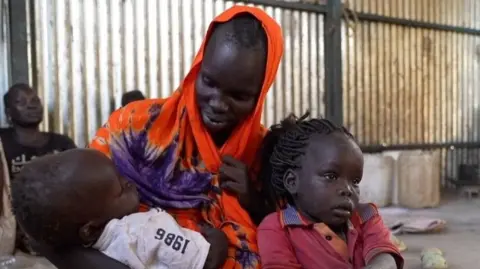As the world grapples with escalating global tensions, recent developments in regions torn apart by civil wars have left thousands stranded at borders, facing an uncertain future. Amidst the socio-political turbulence, these individuals are caught in the crossfire, desperately seeking safety while a new conflict spirals into chaos.
The Exodus of the Displaced
For many fleeing from the clutches of violence and instability, borders have become a temporary refuge rather than a safe haven. After enduring the horrors of civil wars in their home countries—such as Syria, Yemen, and Libya—displaced persons have made perilous journeys in search of peace. A recent report from the United Nations High Commissioner for Refugees (UNHCR) reveals that over 60 million people are forcibly displaced worldwide, with an alarming portion of these individuals facing renewed threats as conflicts reignite.
In September 2023, clashes erupted once again in regions previously considered stabilized. For instance, renewed violence in Northern Syria has been sparked by a resurgence of extremist factions amid changing territorial controls. This escalation has left many fleeing their homes once more, converging at already beleaguered borders that are ill-equipped to handle such inflows.
The Conditions at the Borders
Upon reaching border crossings, many find themselves in dire conditions. Humanitarian organizations report that individuals, including families and unaccompanied minors, are facing overcrowded facilities, limited access to basic needs such as food, water, and medical care, and a lack of proper sanitation. For example, the Temporary Refugee Center at the Turkey-Syria border has become a focal point, with capacity far exceeded, forcing many to sleep on the ground in makeshift shelters as winter approaches.
The burdens placed on neighboring countries are immense. In nations like Turkey, Lebanon, and Jordan—already hosting millions of refugees—resources are strained. The United Nations’ World Food Programme (WFP) has warned that assistance programs are running low on funds, exacerbating food insecurity among vulnerable populations. Reports indicate that many refugees are resorting to negative coping strategies, including child labor and early marriage, as families struggle to survive in hostile environments.
International Responses and Moving Forward
As this crisis unfolds, the international community’s response has been lackluster. Humanitarian agencies call for urgent action, yet political narratives often prioritize national security over humanitarian needs. Countries are tightening border controls and implementing stricter immigration policies, leading to the phenomenon of people being stuck at borders with no viable pathways to safety.
Organizations like Doctors Without Borders and Amnesty International are advocating for increased humanitarian aid and safe passage options for those affected. They stress the need for countries to recognize the moral obligation to assist those fleeing violence.
The Human Cost of Inaction
The plight of these border-stranded individuals is not just a distant headline; it is a resounding humanitarian call to action. Every day thousands are left vulnerable to exploitation, violence, and neglect. Closure of borders and restrictive immigration measures only exacerbate the situation, leaving people like Abdul, a father of two from Syria, who lost his home a second time after fleeing the current conflict, feeling hopeless and trapped.
In conclusion, the intersection of renewed conflicts and a humanitarian crisis at the borders underscores the importance of immediate action. The world must not turn a blind eye to the struggles faced by those who have endured too much already. As nations grapple with their internal issues, the protection and support of the most vulnerable should remain a paramount global priority. It’s time to extend the hand of help, not just at borders, but back to homes that need rebuilding. As we bear witness to this crisis, compassionate action could be the difference between life and death for many.
Email Us on editorial@nnafrica.com













